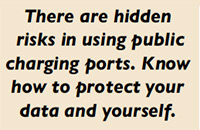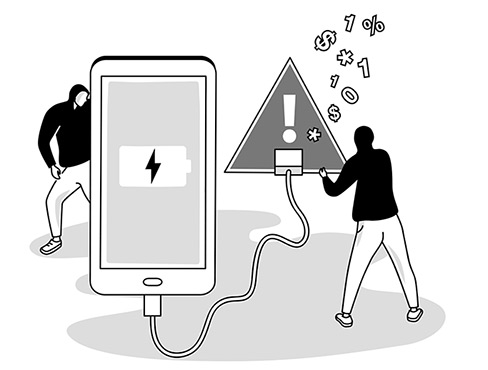Juice Jacking
Sharon Koehler
Stone Industry Consultant
 It used to be, back in the day when cell phones and other electronics weren’t carried around with us, everywhere, it was hard to find public charging ports. Now, you can find them everywhere. Hotel lobbies, bars, airports, coffee shops, restaurants, hair salons and who knows where else – are all offering charging. They make it easy and convenient. Pull your charger out of your purse, pocket, briefcase, backpack or anywhere else you keep it, and just plug up and start charging. Problem solved.
It used to be, back in the day when cell phones and other electronics weren’t carried around with us, everywhere, it was hard to find public charging ports. Now, you can find them everywhere. Hotel lobbies, bars, airports, coffee shops, restaurants, hair salons and who knows where else – are all offering charging. They make it easy and convenient. Pull your charger out of your purse, pocket, briefcase, backpack or anywhere else you keep it, and just plug up and start charging. Problem solved.
You can work a little during flight layovers or read a book while waiting for your dinner companion. Answer emails while you sit tight in a hotel lobby or get a little work done waiting for your friends to meet you at the local coffee shop. Public charging allows us to do more in places we never thought we could before. Convenient, right? No worries, right?
WRONG! There is an expression that says, “Just because you can, doesn’t mean you should.” Sure, you are perfectly capable of pulling out your charger and plugging your device into that public charging port – but should you? NO, say many security experts!
Scammers, hackers, and thieves have figured out ways to load malware into these public charging ports. Then, when you plug in your device to charge, the malware will either lock up your device, possibly making you a target for a ransomware attack, or the malware will attach itself to your device, mining and collecting your personal data, sending it back to the scammers, hackers, and thieves for them to use as they see fit! (Which will not be good for you!)
There are things you can do to protect yourself from being “Juice Jacked.” The first one is obvious: don’t plug into public charging ports. However, if you must charge a device in public, these tips can help prevent issues:
- When you plug into a port, if you get an option on your device to trust this computer, share data or charge only, ALWAYS pick charge only. This prevents data sharing.
- Purchase a charge-only cable. A charge only cable prevents data from being sent or received to or from your device.
- If your device allows wireless charging, carry a wireless charger, and use that instead of plugging in.
- Should your device not allow wireless charging, carry a portable battery pack you can plug into your device and then charge that when needed.
- Instead of using a public charging port, carry an A/C adapter and plug into a wall socket instead.
- Invest in a USB data blocker aka juice-jacker defender to prevent data breaches to your device.
Now, all of a sudden, you remember you used public charging last week and you are wondering if you got juice jacked. There are signs to look for that might let you know if malware has been installed on your device.
- Apps are taking forever to load.
- You are seeing more pop-up ads than usual.
- You have an unexplained jump in your data usage.
- Your device is operating slower than normal.
- The device battery is draining much quicker than normal.
- There are apps on your device you don’t remember downloading.
 Juice jacking is considered a cyber-crime and a federal crime – which means the FBI handles cyber-crime in the United States. If you get juice jacked, you need to report it quickly. The sooner you report it, the quicker they can shut it down. Plus, the faster you act, the more apt you are to recover losses. All you have to do is go to ic3.gov and click on the File a Complaint tab. Then just fill in the info and let them do the work.
Juice jacking is considered a cyber-crime and a federal crime – which means the FBI handles cyber-crime in the United States. If you get juice jacked, you need to report it quickly. The sooner you report it, the quicker they can shut it down. Plus, the faster you act, the more apt you are to recover losses. All you have to do is go to ic3.gov and click on the File a Complaint tab. Then just fill in the info and let them do the work.
Did you know that cyber-crime, not just juice jacking, but all cyber-crime, has more than tripled in the last five years? In 2018, the FBI received just under 352,000 complaints, with total losses at $2.7 billion. Fast forward to 2022: there were just under 801,000 complaints filed, with losses totaling $10.3 billion.
Juice jacking is a newer form of cyber-crime, with not a lot of exposure. Part of the problem is that it is not an instantly recognized crime. Sometimes it takes a while to realize there is a problem. However, the FCC, FBI and numerous other agencies are taking this new age problem seriously, and issuing warnings and tips to the public to try and raise awareness before it becomes a serious issue.
Think about it: how many people are in airports, lobbies and other public places, every day, charging? Millions. That’s millions of opportunities for the bad guys to get their hands on an unimaginable amount of personal and even business data.
Scammers, hackers, and thieves are just sitting around waiting for the good people of the world to plug in and charge. Once you do that, they have access to accounts, passwords, and any other information you keep on your device. Be aware and don’t let them get you.
Please send your thoughts and comments on this article to Sharon Koehler at Sharonk.SRG@gmail.com .